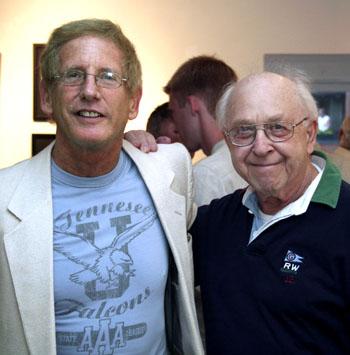Bob Grimson, who owned Quest — a popular gay piano bar on Yonge St in 1969/1970 — died on Feb 9. He was 94.
Grimson was a lifelong friend, mentor and confidant of Barn founder Janko Naglic and even testified in the sensational murder trial of Naglic’s lover, Ivan Mendez-Romero.
Grimson was born in Ireland in 1916 to Jewish-Russian parents. The family moved to Toronto in 1928. On arriving by train from Halifax in a snowy Toronto his mother jokingly told the 11-year-old that his “father has brought us back to Russia.”
As a young man, Grimson served in Europe during World War II. In 2004, he appeared in the National Film Board documentary Open Secrets, in which he discussed the difficulty of being gay in the RCAF.
Grimson told me that he had “one of the gayest times of his life” while a lieutenant in wartime England, Italy and North Africa since many fellow soldiers were into casual gay sex.
While in the Canadian forces in England, he adjudicated the dismissal of one of his fellow soldiers who was revealed to be gay. With his fellow officers, Lieutenant Grimson voted for the man’s dismissal, a decision he came to regret.
Grimson was a very successful businessman and entrepreneur. He made his fortune by starting an instant printing business in Toronto in the ’50s, which he sold in the late 1960s. He invested in stocks, and profits from these investments allowed him to be financially comfortable for the rest of his long life.
He was vacationing in Mexico in 1973 with gay activist lawyer and Club bathhouse founder Peter Maloney when he became rich. “He and I enjoyed the company of several young Mexican men in various parts of the country. Then one day his shares went through the roof and he told me he had just become a millionaire,” says Maloney.
Grimson also owned a coffee house in Yorkville during the hippie era of the ’60s.
In 1969, as owner of Quest, he hired a young Janko Naglic (recently arrived from his native Slovenia) as a bookkeeper and then as a bartender there. During this period, Grimson taught Naglic the ropes of running a gay business. With Grimson’s guidance, Naglic eventually opened Les Cavaliers and The Barn (at Church and McGill streets) after leaving Quest in the early ’70s.
Naglic went on to become a gay entrepreneurial legend before he was murdered in October 2004. (He was found bound and duct-taped and dead of asphyxiation in his home.)
At the murder trial, Grimson testified that Naglic had come unexpectedly to his house on the evening of his death to confide that his life was in danger and seek his advice on what to do about it. Grimson was the last known person except the killer to see Naglic alive. Grimson grimly explained his final conversation in testimony at the murder trial.
“[Janko] was worried about being attacked and about his life… and if there would be any of it at all.”
Grimson advised Naglic to have his lover move out and to change the locks. (After deliberating for a little over three hours the jury found Ivan Mendez-Romero not guilty of the Naglic murder.)
During his testimony, the cops, Crown and defence attorneys treated him with kid gloves as a frail senior citizen. Afterwards, he and I went for lunch, zooming away from the court building in his red Toyota Celica sports car, which he drove into his 91st year.
Grimson befriended and mentored many, including a young Peter Maloney, who with Grimson’s connections helped open the Club Toronto bathhouse on Mutual St. He also became a lifelong friend of gay activist George Hislop, whom Grimson once told me he met “when George was still chicken — an attractive 16-year-old lad at the time.”
Another friend was champion figure skater Toller Cranston, who Grimson helped get his start in the art world. Alan Schwartz, Grimson’s nephew, tells a funny anecdote about Grimson’s friendship with Cranston.
“Once at the Granite Club in the mid-1970s, while Toller was practising, Bob was mistaken by some people there as Bobby Riggs [the then 55-year-old tennis champion]. Cranston went around telling people that Grimson was Riggs, and Grimson gamely went along with the gag by going around that afternoon signing Riggs’ autograph.”
Maloney says Grimson “always had a little mirth around him.” And indeed, Grimson was an upbeat man who was often prone to giving renditions of show tunes at the drop of a hat. He was a man who loved life and lived it to the fullest — travelling the world, entertaining friends and mentoring young men. As his nephew told me, “being around younger people kept him always feeling young.”
Grimson lived for the last 50 years of his life in a small, elegant house on Cottingham (near Avenue Rd, just north of Dupont) that he designed with a uniquely (for its time) open living space. Its walls were completely covered by his eclectic collection of Canadian art.
There will be no funeral, but a celebration of his life will be held in the spring.

 Why you can trust Xtra
Why you can trust Xtra


